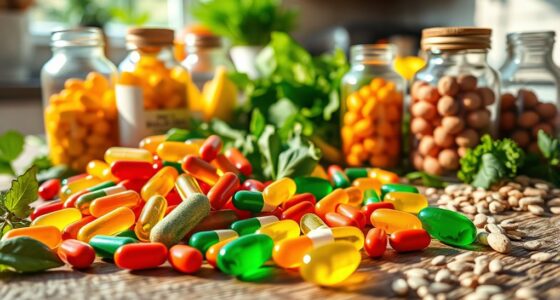To get energy on the keto diet, focus on staying hydrated and balancing your macronutrients. Aim for 70-80% healthy fats, 10-20% protein, and only 5-10% carbs. Incorporating foods like avocados, fatty fish, and nuts will help sustain your energy levels. Don't forget about electrolytes—foods rich in sodium, potassium, and magnesium are essential. Regular meal planning and smart snacking can prevent energy crashes, so keep healthy options on hand. Finally, find the right exercise balance to boost your mood and energy. There's more to explore about optimizing your keto experience, so keep going!
Key Takeaways
- Maintain proper hydration and electrolyte balance to prevent fatigue and enhance energy levels on a keto diet.
- Consume a macronutrient ratio of 70-80% fats, 5-10% carbohydrates, and 10-20% protein for sustained energy.
- Incorporate energy-boosting foods like fatty fish, eggs, nuts, and avocados into your meals and snacks.
- Adjust caloric intake based on activity levels to avoid fatigue and ensure adequate energy for exercise.
- Plan meals regularly to maintain steady energy levels and prevent carbohydrate overload.
Understanding the Ketogenic Diet

The ketogenic diet, often referred to as keto, is a powerful approach to nutrition that shifts your body's energy source from carbohydrates to fats. By adopting a low carbohydrate intake—typically under 50 grams per day—you encourage your body to enter a state known as ketosis.
In ketosis, your body begins to convert stored body fat into ketones, which serve as an alternative energy source. This process not only facilitates fat loss but also helps stabilize blood sugar levels, making it beneficial for various health issues. Additionally, incorporating foods rich in antioxidants, such as celery juice, can provide added benefits for energy and overall health on the keto diet.
On the keto diet, you'll consume approximately 70-80% fats, 5-10% carbohydrates, and 10-20% protein. It's vital to maintain a balanced intake of high-quality fats and proteins to sustain energy production and overall well-being.
However, as your body adjusts to this new energy source, you may experience symptoms commonly known as the "keto flu," like fatigue and headaches. These symptoms are temporary and a sign that your body is adapting to utilizing fats instead of carbs.
Once you're through this phase, many people report increased energy levels and improved mental clarity, making the keto diet an effective option for many.
Importance of Hydration and Electrolytes

Staying hydrated is essential for keeping your energy levels up on a ketogenic diet, as dehydration can lead to fatigue and brain fog.
Incorporating electrolytes into your regimen is equally important, as these minerals, including sodium, magnesium, and potassium, play a key role in your overall well-being.
Additionally, cold medications overview can provide insights into maintaining health while managing symptoms that may arise during your dietary changes.
Recognizing the signs of dehydration can help you maintain peak performance and avoid energy crashes.
Hydration's Role in Energy
Hydration plays an indispensable role in maintaining your energy levels on a ketogenic diet. When you're not drinking enough water, you might experience fatigue, brain fog, and muscle cramps.
Adequate water intake is critical for keeping your fluid balance in check, which can also affect your appetite and metabolic rate. Additionally, incorporating essential oils for energy can provide a natural boost and enhance your overall well-being.
To support your energy levels, consider incorporating electrolyte powders into your routine. These can help replenish important minerals like magnesium and potassium, which are crucial for energy production and muscle function.
Additionally, since lower carb diets can lead to increased sodium excretion, it's important to monitor your sodium levels. Increasing your salt intake with high-quality salts can help you maintain the necessary balance.
Electrolyte Sources and Benefits
Maintaining your electrolyte balance is fundamental when you're on a ketogenic diet, as it directly impacts your energy levels and overall health.
Electrolyte imbalances can happen due to the diuretic effect of ketosis, which makes replenishing sodium, potassium, and magnesium essential.
Additionally, ensuring a clean environment with good air quality can also enhance your overall well-being, as air purifiers improve air quality and reduce allergens that might affect energy levels.
Dehydration can lead to fatigue, brain fog, and muscle cramps, so monitoring your fluid intake is critical.
Here are three effective sources to help you maintain your electrolytes:
- High-Quality Salts: Increasing your salt intake with high-quality salts like Himalayan pink salt can help maintain sodium levels, especially during the initial stages of keto.
- Potassium and Magnesium-Rich Foods: Incorporate foods like avocados and fish into your diet to support energy production and overall well-being.
- Electrolyte Powders: Using electrolyte powders can effectively replenish lost minerals and help prevent symptoms commonly associated with the "keto flu," ensuring sustained energy levels.
Signs of Dehydration Awareness
Your body's need for hydration becomes even more significant on a ketogenic diet, as dehydration can sneak up on you, leading to fatigue, brain fog, and muscle cramps. Since your body shifts to ketosis, it can increase water loss, making adequate water intake essential for maintaining energy levels.
Proper hydration not only supports energy but also plays a role in kidney health maintenance, which is critical for overall well-being. If you're not mindful of your hydration, you might notice a drop in your appetite and metabolic rate, which could hinder your weight loss efforts.
To combat dehydration, focus on replenishing lost minerals. Electrolyte balance is essential, especially with sodium levels that can dip when you reduce carbs. You can increase your salt intake with high-quality salts, ensuring you stay hydrated and support your body's needs.
Foods rich in potassium and magnesium, like avocados and fish, can also help prevent fatigue and keep your energy levels steady.
Monitor your water intake closely, as signs of dehydration can be subtle. Staying proactive about hydration and electrolytes will boost your energy and enhance your overall wellbeing on the keto diet.
Nutritional Strategies for Energy

To boost your energy on a keto diet, you need to pay close attention to your macronutrient balance. Ensuring you get the right amount of fats, proteins, and carbs will help keep your energy levels steady.
Additionally, understanding your budget for food expenses can help you invest in high-quality ingredients.
Furthermore, managing hydration and electrolytes is essential for maintaining overall vitality as you adapt to this lifestyle.
Macronutrient Balance Importance
Achieving a proper macronutrient balance is crucial for sustaining energy levels on a keto diet. To thrive in ketosis, you'll want to aim for approximately 70-80% healthy fats, 5-10% carbohydrates, and 10-20% protein. This balance promotes optimal metabolic processes and energy production, much like how design thinking fosters creative problem-solving in innovative processes.
Here are three key strategies to guarantee you maintain that balance:
- Prioritize Healthy Fats: Focus on sources like avocados, olive oil, and fatty fish. These provide essential fatty acids that enhance energy levels while keeping your carb intake low.
- Monitor Protein Intake: Aim for around 1.2 to 2.0 grams of protein per kilogram of your body weight. Adequate protein supports muscle maintenance and overall energy.
- Incorporate Low-Carb Vegetables: Include nutrient-dense options such as spinach and broccoli. They help meet your micronutrient needs without affecting your macronutrient ratios.
Regularly adjusting macronutrient ratios based on your activity levels and energy needs is critical. This practice can prevent fatigue and guarantee you remain energized throughout your day on the keto diet.
Hydration and Electrolytes Management
While following a keto diet, staying hydrated and managing electrolytes is essential for maintaining energy levels and overall well-being. Dehydration can lead to fatigue, brain fog, and muscle cramps, so you need to prioritize hydration. Make sure to drink plenty of water throughout the day, and consider incorporating electrolyte powders to replenish lost minerals.
It's also important to be aware of the financial aspects of managing dietary needs, especially for seniors, as financial considerations for elderly care can impact food choices and access to necessary supplements.
Electrolyte management is vital, especially when it comes to sodium, magnesium, and potassium. Increasing your salt intake with high-quality salts will help maintain sodium levels, particularly during the initial stages of the keto diet. Foods rich in magnesium and potassium, such as avocados and fish, can further support your hydration efforts.
Monitoring your hydration status not only supports energy levels but also influences your appetite and metabolic rate. Staying well-hydrated helps regulate these factors, making it easier to stick to your keto plan.
Energy-Boosting Foods and Snacks

Incorporating energy-boosting foods and snacks into your keto diet is essential for maintaining vigor and focus throughout the day. To keep your energy levels high while sticking to your low-carb diet, consider these options:
1. Oily Fish: Salmon and mackerel are packed with omega-3 fatty acids and B vitamins, providing sustained energy and supporting overall health on your ketogenic diet.
Including essential beach toys can enhance family outings, ensuring you stay active and energized.
2. Eggs: These are an excellent source of protein and important amino acids. Eggs offer long-lasting energy without causing blood sugar spikes, making them perfect for keto snacking.
3. Nuts and Seeds: Almonds, walnuts, chia, and flaxseeds are nutrient-dense snacks that deliver healthy fats, fiber, and antioxidants. They promote energy release and reduce inflammation, making them ideal for your energy-boosting needs.
In addition to these foods, don't forget about options like fatty cuts of red meat and dark poultry, which are high in protein and fats with zero carbohydrates.
And for on-the-go energy without compromising ketosis, grab some keto-friendly snacks like LLS Keto Bars.
Exercise Balance for Optimal Energy

Finding the right exercise balance is fundamental for keeping your energy levels high on a ketogenic diet. Overexercising without proper caloric replenishment can lead to fatigue, making it essential to align your workouts with your energy needs.
As technology evolves, the demand for skilled professionals, such as AI software engineers, is growing, highlighting the significance of maintaining energy for peak performance in various sectors. Regular physical activity boosts your overall mood and liveliness, which contributes to maintaining energy throughout the day.
Your energy levels can fluctuate based on your daily activity patterns, so incorporating movement into your routine can provide those much-needed energy boosts. Instead of leading a sedentary lifestyle that may increase feelings of exhaustion, aim to stay active. Simple changes, like taking breaks to stretch or walk, can make a significant difference.
To guarantee you're engaging in the right amount of exercise, consider consulting with a doctor or trainer. They can help you develop an effective exercise plan tailored to your needs, assuring that you're not overexerting yourself while still benefiting from physical activity.
Tips for Maintaining Energy Levels

To keep your energy levels up on a ketogenic diet, it's important to focus on several key habits. These practices will help you stay energized and combat fatigue as you adapt to ketosis.
1. Stay Hydrated: Make certain you're drinking enough water throughout the day. Electrolytes like magnesium, potassium, and sodium are vital, so consider adding electrolyte-rich foods or supplements to your routine.
2. Balanced Caloric Intake: Undereating can lead to decreased energy hormone production. Verify you're consuming enough calories from nutrient-dense, whole foods like avocados, fatty fish, and nuts.
These foods provide the essential fats and proteins your body needs to sustain energy levels.
3. Meal Planning: Regular meal planning will help you maintain steady energy levels and prevent carb overload.
Include high-quality snacks to keep your carbohydrate intake in check, so you can avoid energy crashes and maximize your keto journey.
Frequently Asked Questions
Why Am I so Tired on a Keto Diet?
You might feel tired on a keto diet due to the change your body's making. Dehydration, electrolyte imbalances, or not eating enough can all contribute to fatigue. Make certain you're hydrating and consuming adequate calories.
What Foods Give You Energy on a Keto Diet?
To boost your energy on a keto diet, focus on oily fish, eggs, nuts, seeds, fatty meats, and avocados. These foods provide healthy fats and proteins, ensuring steady energy without sugar spikes.
How Long Does It Take to Get More Energy on Keto?
Getting greater energy on keto generally takes about one to two weeks. You might feel fatigued initially, but as your body adapts, energy levels can elevate, often peaking around three to four weeks. Stay hydrated!
How Can I Accelerate My Keto?
To accelerate your keto journey, focus on gradually reducing carbs, increasing healthy fats, and incorporating MCT oil. Stay hydrated and active, and monitor your electrolyte intake to support your body's adaptation process efficiently.
Conclusion
Incorporating these strategies can keep your energy levels soaring on a keto diet like a kite dancing in the wind. Staying hydrated and replenishing electrolytes is essential, while choosing the right foods guarantees you fuel your body effectively. Balance your workouts to avoid burnout, and don't forget to listen to your body's needs. By following these tips, you can maintain consistent energy and enjoy the benefits of your ketogenic journey. Keep your energy high and thrive!









